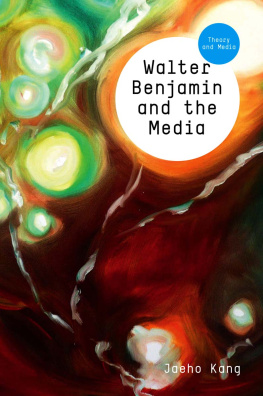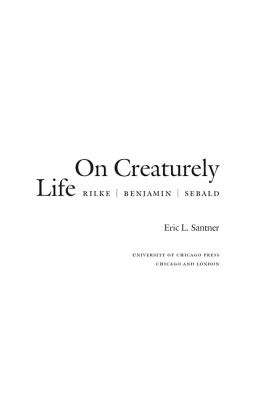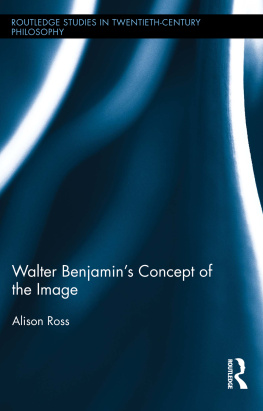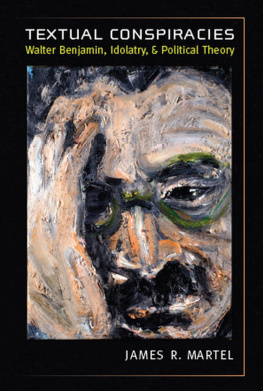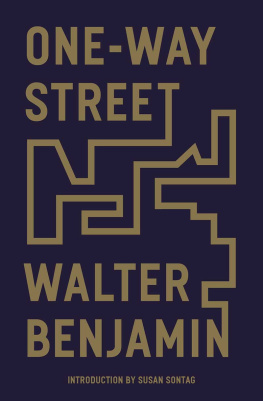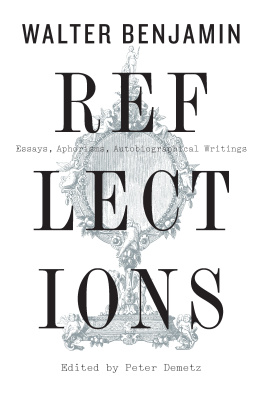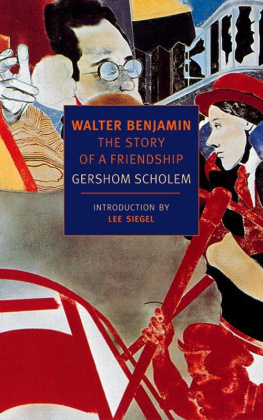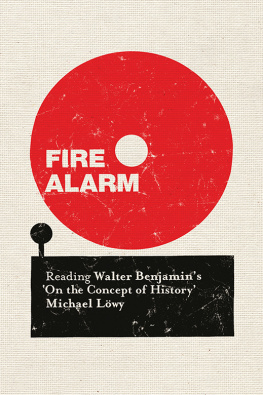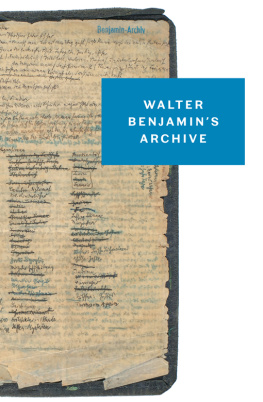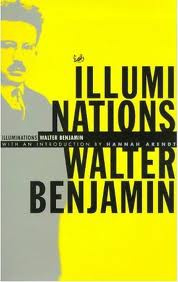WALTER BENJAMIN AND THE MEDIA
Theory and the Media
John Armitage, Virilio and the Media
David Gunkel and Paul A. Taylor, Heidegger and the Media
Philip Howard, Castells and the Media
Jaeho Kang, Walter Benjamin and the Media
Paul A. Taylor, iek and the Media
Geoffrey Winthrop-Young, Kittler and the Media
Copyright Jaeho Kang 2014
The right of Jaeho Kang to be identified as the Author of this Work has been asserted in accordance with the UK Copyright, Designs and Patents Act 1988.
First published in 2014 by Polity Press
Polity Press
65 Bridge Street
Cambridge CB2 1UR, UK
Polity Press
350 Main Street
Malden, MA 02148, USA
All rights reserved. Except for the quotation of short passages for the purpose of criticism and review, no part of this publication may be reproduced, stored in a retrieval system, or transmitted, in any form or by any means, electronic, mechanical, photocopying, recording or otherwise, without the prior permission of the publisher.
ISBN-13: 978-0-7456-7084-3
A catalogue record for this book is available from the British Library.
The publisher has used its best endeavours to ensure that the URLs for external websites referred to in this book are correct and active at the time of going to press. However, the publisher has no responsibility for the websites and can make no guarantee that a site will remain live or that the content is or will remain appropriate.
Every effort has been made to trace all copyright holders, but if any have been inadvertently overlooked the publisher will be pleased to include any necessary credits in any subsequent reprint or edition.
For further information on Polity, visit our website: www.politybooks.com
To Junghee Ryu and Kisoo Kang
CONTENTS
ABBREVIATIONS
| SW | Selected Writings, vols IIV, eds. Marcus Bullock, Michael Jennings et al. Cambridge, MA: Harvard University Press, 19962003. |
| GS | Gesammelte Schriften, vols IVII, eds. Rolf Tiedemann and Hermann Schweppenhuser, with the collaboration of Theodor Adorno and Gershom Scholem. Frankfurt am Main: Suhrkamp Verlag, 1974. Taschenbuch Ausgabe, 1991. |
| AP | The Arcades Project, trans. Howard Eiland and Kevin McLaughlin. Cambridge, MA: Belknap Press of Harvard University Press, 1999. References to the Arcades Project are given by Convolute number and page. |
| ABC | Theodor W. Adorno Walter Benjamin: The Complete Correspondence 19281940. ed. Henri Lonitz, trans. Nicholas Walker. Cambridge: Polity, 1999. |
| BSC | The Correspondence of Walter Benjamin and Gershom Scholem 19321940, ed. Gershom Scholem, trans. Gary Smith and Andre Lefevre, Introduction by Anson Rabinbach. Cambridge, MA: Harvard University Press, 1992. |
| C | The Correspondence of Walter Benjamin, ed. and annotated by Gershom Scholem and Theodor Adorno, trans. Manfred Jacobson and Evelyn Jacobson, Foreword by Gershom Scholem. Chicago and London: University of Chicago Press, 1994. |
| Media | Work of Art in the Age of Its Technological Reproducibility, and Other Writings on Media, eds. Michael W. Jennings, Brigid Doherty and Thomas Levin, trans. Edmund Jephcott, Rodney Livingstone, Howard Eiland, and Others. Cambridge, MA: Harvard University Press, 2008. |
| OGTD | The Origin of German Tragic Drama, trans. John Osbourne, Introduction by George Steiner. London: Verso, 1985. |
ACKNOWLEDGEMENTS
This is a small book, but there is a large number of people I would like to thank.
A great debt is owed to the students at the New School and at SOAS who have participated over the years in my classes on the critical theory of media. Their exhaustive curiosity and radical imagination have provoked this book to engage more with politics of contemporary media culture. I am also very grateful to my mentors and Doktorvter for their guidance, support and encouragement throughout: John Thompson, Nick Couldry, Axel Honneth, Gyuhwan Seo, the late David Frisby, the late Miriam Hansen, Elihu Katz, Daniel Dayan, Jeffrey Goldfarb, Andrew Arato and Patrick Baert. I hope that my debt to and respect for their insights are evident throughout this book. Thanks are also due to my friends and colleagues who made intellectual contributions to this work: Paolo Carpignano, Vinayak Chaturvedi, Lawrence Hamilton, Noah Isenberg, Troels Degn Johansson, Andreas Kalyvas, Sungdo Kim, Robert Kirkbride, Claus Krogholm, Shannon Mattern, Marcos Nobre, Dominic Pettman, Martin Roberts, Jos Rodrigo Rodriguez, Sanjay Ruparelia, Barry Salmon, Martin Saar, Nidhi Srinivas, Erik Steinskog, Sam Tobin, and McKenzie Wark. Bernadette Boyle deserves special mention for her help with meticulous proofreading in preparing the manuscript in every state. Parts of the chapters appeared in the following journals: Constellations, Theoria, and International Journal of Politics, Culture and Society. I thank them for the permission to use.
I would especially like to express my gratitude to Graeme Gilloch. Since we first met in a caf near the University of Frankfurt in 2001, he has rigorously encouraged me to pursue the topical issues we discussed and helped elaborate my rough ideas at every stage of their development. Without his friendship, this book would not have been possible. I am deeply grateful to Jeesoon Hong for many years of understanding, patience and encouragement. I also wish to thank my sisters, Moonhee and Jinhee for their understanding and support especially over the past few years.
This book is dedicated to my parents, Junghee Ryu and Kisoo Kang, for their endless generosity, patience and understanding.
INTRODUCING DR BENJAMIN
THERE AND THEN, HERE AND NOW
Key Works
Curriculum Vitae (I) (1925)
Curriculum Vitae (VI): Dr Walter Benjamin (1940)
In September 1940, on the Franco-Spanish border, Walter Benjamin, aged just 48, committed suicide. At that time, the media world that we know today was only in embryonic form: few people had telephones; television was in its infancy as a technology; in terms of film, the age of the silent screen was fresh in the memory and the use of colour still something of a novelty; the printed word, of newspapers, magazines and journals still predominated, while radio had emerged as its main electronic rival. For his generation, the wireless had an altogether different meaning. Some seventy years later, we live in a globalized world dominated by electronic communications of all kinds: mobile technologies, information and communication technologies (ICTs), satellite channels, instant global telecommunications, blogs, social networking sites, tweets, palm-held instant Internet access pads and pods. What, then, can Benjamins writings tell us about our own twenty-first-century world of ubiquitous digital media? What kind of challenges and questions might they pose for readers today, for whom instant communication across the globe, instant access to information, instant downloads, gaming graphics, 3D, HD, massively multiplayer online role-playing games (MMORPGs), live broadcast TV events from most distant parts of the world, and omnipresent advertising are such an integral part of everyday life that we scarcely notice them, let alone think about them?

